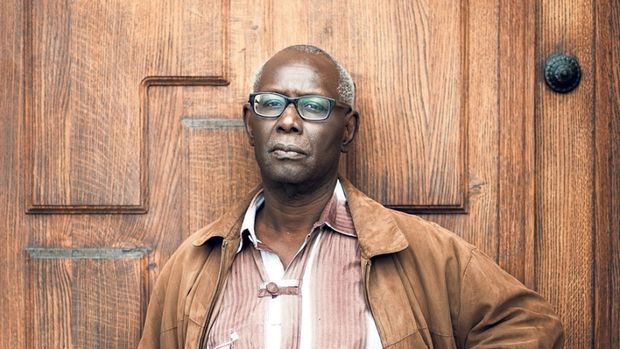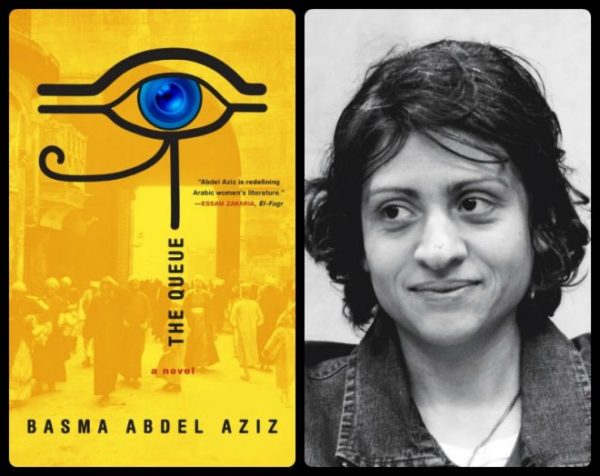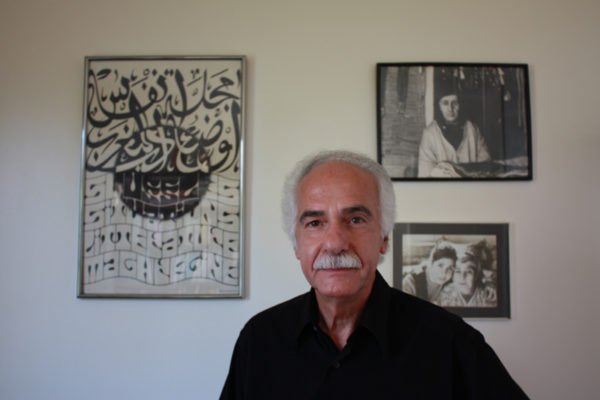
Thirty-five books have been named on the fiction and poetry longlists of the 2017 Best Translated Book Prize. On the 25-strong fiction list are Senegalese author Boubacar Baris Diop’s novel Doomi Golo: The Hidden Notebooks and Egyptian author Basma Abdel Aziz’s novel The Queue, and on the 10-strong poetry list is Moroccan author Abdellatif Laabi’s collection In Praise of Defeat.
Since 2008, the Best Translated Book Prize has honoured the finest original translation of a work of fiction or poetry into English. Given by the Three Percent magazine, the $5,000 prize money is donated by Amazon.

Diop’s novel, the first ever to be translated from Wolof to English, is the story of a man who, after losing his son, finds himself in a desperate need to communicate to his grandson, whose whereabouts he is unaware of, through notebooks. Its translation from the Wolof was done by Vera Wulfing-Leckie and El Hadji Moustapha Diop. Below is its description on the Mookse and Gripes.
The first novel to be translated from Wolof to English, Doomi Golo: The Hidden Notebooks is a masterful work that conveys the story of Nguirane Faye and his attempts to communicate with his grandson before he dies. With a narrative structure that beautifully imitates the movements of a musical piece, Diop relates Faye’s trauma of losing his only son, Assane Tall, which is compounded by his grandson Badou’s migration to an unknown destination. While Faye feels certain that his grandson will return one day, he also is convinced that he will no longer be alive by then. Faye spends his days sitting under a mango tree in the courtyard of his home, reminiscing and observing his surroundings. He speaks to Badou through his seven notebooks, six of which are revealed to the reader, while the seventh, the “Book of Secrets,” is highly confidential and reserved for Badou’s eyes only. In the absence of letters from Badou, the notebooks form the only possible means of communication between the two, carrying within them tunes and repetitions that give this novel its unusual shape: loose and meandering on the one hand, coherent and tightly interwoven on the other. Translated by Vera Wülfing-Leckie and El Hadji Moustapha Diop.

Aziz’s novel, set in an Egypt crippled by totalitarianism, follows a young man as he tries to obtain permission to treat himself from the mysterious government, as well as a doctor who must choose whether to flout orders and help people without the authorities’ knowledge. It was translated from the Arabic by Elisabeth Jaquette. From the Mookse and Gripes:
In a surreal, but familiar, vision of modern day Egypt, a centralized authority known as ‘the Gate’ has risen to power in the aftermath of the ‘Disgraceful Events,’ a failed popular uprising. Citizens are required to obtain permission from the Gate in order to take care of even the most basic of their daily affairs, yet the Gate never opens, and the queue in front of it grows longer.
Citizens from all walks of life mix and wait in the sun: a revolutionary journalist, a sheikh, a poor woman concerned for her daughter’s health, and even the brother of a security officer killed in clashes with protestors. Among them is Yehia, a man who was shot during the Events and is waiting for permission from the Gate to remove a bullet that remains lodged in his pelvis. Yehia’s health steadily declines, yet at every turn, officials refuse to assist him, actively denying the very existence of the bullet.
Ultimately it is Tarek, the principled doctor tending to Yehia’s case, who must decide whether to follow protocol as he has always done, or to disobey the law and risk his career to operate on Yehia and save his life.
Written with dark, subtle humor, The Queue describes the sinister nature of authoritarianism, and illuminates the way that absolute authority manipulates information, mobilizes others in service to it, and fails to uphold the rights of even those faithful to it.

Abdellatif Laabi’s In Praise of Defeat is his seventeenth poetry collection. As fiercely political as he is prolific, his work and activism earned him imprisonment and torture in the 1970s and ’80s in Morocco.
Here is the full longlist.
Fiction:
- The Queue by Basma Abdel Aziz,
translated from the Arabic by Elisabeth Jaquette (Egypt, Melville House). - The Young Bride by Alessandro Baricco, translated from the Italian by Ann Goldstein (Italy, Europa Editions).
- Wicked Weeds by Pedro Cabiya, translated from the Spanish by Jessica Powell (Dominican Republic, Mandel Vilar Press).
- Chronicle of the Murdered House by Lúcio Cardoso, translated from the Portuguese by Margaret Jull Costa and Robin Patterson (Brazil, Open Letter Books).
- On the Edge by Rafael Chirbes, translated from the Spanish by Margaret Jull Costa (Spain, New Directions).
- Eve Out of Her Ruins by Ananda Devi, translated from the French by Je rey Zuckerman (Mauritius, Deep Vellum).
- Zama by Antonio di Benedetto, translated from the Spanish by Esther Allen (Argentina, New York Review Books).
- A Spare Life by Lidija Dimkovska, translated from the Macedonian by Christina Kramer (Macedonia, Two Lines Press).
- Doomi Golo by Boubacar Boris Diop, translated from the Wolof by Vera Wülfing-Leckie and El Hadji Moustapha Diop (Senegal, Michigan State University Press).
- Night Prayers by Santiago Gamboa, translated from the Spanish by Howard Curtis (Colombia, Europa Editions).
- Angel of Oblivion by Maja Haderlap, translated from the German by Tess Lewis (Austria, Archipelago Books).
- War and Turpentine by Stefan Hertmans, translated from the Dutch by David McKay (Belgium, Pantheon).
- Umami by Laia Jufresa, translated from the Spanish by Sophie Hughes (Mexico, Oneworld).
- Last Wolf and Herman by László Krasznahorkai, translated from the Hungarian by George Szirtes and John Batki (Hungary, New Directions).
- Oblivion by Sergei Lebedev, translated from the Russian by Antonina W. Bouis (Russia, New Vessel Press).
- Thus Bad Begins by Javier Marías, translated from the Spanish by Margaret Jull Costa (Spain, Knopf).
- In the Café of Lost Youth by Patrick Modiano, translated from the French by Chris Clarke (France, New York Review Books).
- Ladivine by Marie NDiaye, translated from the French by Jordan Stump (France, Knopf).
- Among Strange Victims by Daniel Saldaña París, translated from the Spanish by Christina MacSweeney (Mexico, Coffee House Press).
- Moonstone by Sjón, translated from the Icelandic by Victoria Cribb (Iceland, FSG).
- Memoirs of a Polar Bear by Yoko Tawada, translated from the German by Susan Bernofsky (Japan/Germany, New Directions).
- Vampire in Love by Enrique Vila-Matas, translated from the Spanish by Margaret Jull Costa (Spain, New Directions).
- My Marriage by Jakob Wassermann, translated from the German by Michael Hofmann (Germany, New York Review Books).
- Moshi Moshi by Banana Yoshimoto, translated from the Japanese by Asa Yoneda (Japan, Counterpoint Press).
- Super Extra Grande by Yoss, translated from the Spanish by David Frye (Cuba, Restless Books).
Poetry:
- Berlin-Hamlet by Szilárd Burbly, translated from the Hungarian by Ottilie Mulzet (Hungary, New York Review Books).
- Of ings by Michael Donhauser, translated from the German by Nick Ho and Andrew Joron (Austria, Burning Deck Press).
- Instructions Within by Ashraf Fayadh, translated from the Arabic by Mona Kareem, Mona Zaki, and Jonathan Wright (Palestine, Operating System).
- Cheer Up, Femme Fatale by Yideum Kim, translated from the Korean by Ji Yoon Lee, Don Mee Choi, and Johannes Göransson (South Korea, Action Books).
- In Praise of Defeat by Abdellatif Laâbi, translated from the French by Donald Nicholson-Smith (Morocco, Archipelago Books).
- Extracting the Stone of Madness by Alejandra Pizarnik, translated from the Spanish by Yvette Siegert (Argentina, New Directions).
- The Thief of Talant by Pierre Reverdy, translated from the French by Ian Seed (France, Wake eld Press).
- tasks by Víctor Rodríguez Núñez, translated from the Spanish by Katherine M. Hedeen (Cuba, co-im-press).
- Building the Barricade by Anna Świrszczyńska, translated from the Polish by Piotr Florczyk (Poland, Tavern Books).
- Antígona González by Sara Uribe, translated from the Spanish by John Pluecker (Mexico, Les Figues Press).
Congratulations to Boubacar Baris Diop, Basma Abdel Aziz and Abdellatif Laabi.
The shortlists will be released on April 18, and the winners announced on May 4, 2017.
Read the full announcement on World Literature Today.
*****
Photos from Google.









非漂 [Fēi Piāo] April 2017 Newsbriefs – Bruce Humes March 01, 2020 06:36
[…] Abdellatif Laabi’s collection In Praise of Defeat. You can read background info about these three here. Doomi Golo is reportedly the first novel ever to be translated from the Wolof into English. But […]